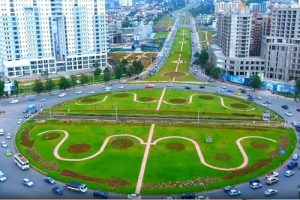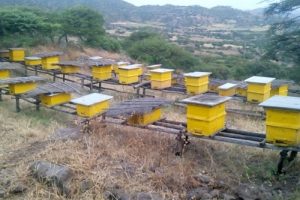
The Somali Regional State in Ethiopia is emerging as a promising economic hub, offering a wide range of investment opportunities. With a vision to bolster economic growth, the region has created a favorable environment for both domestic and international investors, spanning industries such as agriculture, manufacturing, and services. The Somali Region Investment and Industry Office has been actively promoting collaboration with diaspora, domestic, and foreign investors, issuing licenses, and establishing channels of support.
These efforts have yielded significant results, attracting substantial investments and fostering job creation. The state presents a wide array of investment opportunities across various industries, including agriculture, manufacturing, and services. Ibrahim Ahmed, the Industry Sector Deputy Head of the Investment and Industry Office, has emphasized the region’s potential for business expansion and development. Currently, the region hosts 309 industries, indicating its readiness for investment and growth.
Over the past six months, the investment office has issued 171 investment licenses, reflecting the increasing interest in the region. These investments have already made a substantial impact, with investors registering 3.6 billion birr. The influx of capital into the Somali Region has resulted in the creation of 6,116 job opportunities. Of these, 2,907 are permanent positions, ensuring long-term stability, while 3,209 are temporary, catering to immediate labor market needs. The region’s industrial growth and the active involvement of diaspora investors have significantly contributed to job creation and economic development.
“The Region has successfully attracted the engagement of diaspora investors, with 14 members of the diaspora community participating in various projects such as water and tin factories, car assembly plants, and other large-scale ventures. The active involvement of the diaspora community highlights the trust and confidence placed in the region’s growth potential. Their contributions not only drive economic growth but also strengthen the ties between the diaspora and their home region, fostering a sense of pride and shared success”.
As to him, the Region has been investing in infrastructure development to support economic growth. This includes the construction and improvement of roads, bridges, ports and other infrastructures, which not only facilitate the movement of goods and services within the region but also enhance connectivity with neighbouring regions and countries. The improved infrastructure opens up new avenues for investment and trade, attracting businesses and investors looking to take advantage of the region’s strategic location.
Moreover, he added that the region is possessing significant potential for renewable energy generation, particularly in wind and solar power. The region’s vast open spaces and favourable climatic conditions make it an ideal location for renewable energy projects. Investing in renewable energy not only contributes to environmental sustainability but also provides opportunities for businesses and investors to tap into the growing global demand for clean energy solutions.
Office’s Investment Sector Deputy Head Zeineb Haji, for her part mentioned that a lot of fruitful activities have been undertaking in order to attract investment. As to her, mobilization works are being undertaken in and out, adding that they have made mobilization in different foreign countries in order to attract investors. Accordingly number of diaspora participation in the region is increasing from time to time. Diasporas have 90 % contribution for the investment in the region, she added.
The recently signed MoU between Ethiopia and Somaliland has further enhanced the region’s industrial development prospects. This agreement is expected to contribute significantly to the region’s progress and the overall advancement of the nation.
For her, the region boasts rich cultural heritage, historical sites, and scenic landscapes, making it a potential tourist destination. Investing in the tourism and hospitality sectors can help unlock the region’s untapped potential, create employment opportunities, and boost the local economy. The development of hotels, resorts, and tourist infrastructure, along with the preservation and promotion of cultural heritage, can attract domestic and international tourists, leading to increased revenue and economic growth.
“Investing in human capital is crucial for long-term economic growth and sustainability. The Somali Region has been focusing on improving education and vocational training programs to equip its workforce with the necessary skills and expertise. Collaboration with educational institutions, both domestic and international, can help in developing a skilled workforce capable of meeting the demands of various industries and sectors, further attracting investment and facilitating economic growth”.
The perception of citizens across the region regarding the benefits of agriculture has undergone a significant change. The regional government is actively working to increase agricultural productivity, which is vital for economic development. Abdi Aden, the Crop Production Development and Protection Director at the State’s Bureau of Agriculture, has highlighted the efforts being made to increase production across the region.
Plans have been put in place to cover 11,000 hectares of land for irrigation and winter wheat production. In the past six months alone, 559 hectares have been covered by irrigation, with an expected wheat production of 16,770 quintals from irrigation projects and 122,900 quintals from winter rain. These agricultural activities contribute to the overall economic development of the region and the nation as a whole, he added.
According to him, the region’s proximity to neighboring countries presents opportunities for regional integration and trade. Strengthening trade relations, improving cross-border infrastructure, and harmonizing trade policies can lead to increased trade volumes and investment inflows. The region can serve as a gateway for businesses looking to access markets in the Horn of Africa and beyond, further stimulating economic growth and development.

Cognizant of the fact that agriculture plays a vital role in the region’s economy, he added that investing in sustainable agriculture practices, modernizing farming techniques, and promoting agribusiness can enhance productivity, increase value-added processing, and improve market access for farmers. This not only contributes to food security but also creates employment opportunities and boosts rural incomes, driving economic growth in the region, he added.
According to the officials, the Investment and Industry Office is also offering incentives for investors, like duty-free investment and license service excellence, among others. The Investment and Industry Office is offering various incentives to attract investors. These include duty-free benefits, investment license service excellence, and other advantages. The provision of incentives underscores the region’s commitment to creating a conducive investment climate and encouraging business growth, they noted.
All things considered, the Somali Regional State in Ethiopia offers fertile ground for investment with its burgeoning industrial growth and active engagement of diaspora investors. According to the officials, the region’s investment potential spans across sectors such as agriculture, manufacturing, and services.
The region offers a range of investment opportunities across various sectors, including infrastructure, renewable energy, tourism, human capital development, financial and business support services, regional trade, and agriculture. Through leveraging these opportunities and implementing favorable policies and incentives, the region can attract more investments, stimulate economic growth, create employment opportunities, and contribute to the overall development and prosperity of the nation.
Through the issuance of investment licenses and the provision of incentives, the Investment and Industry Office actively supports and encourages investment. The recently signed MoU with Somaliland further enhances the region’s industrial development prospects. Additionally, the region’s commitment to increasing agricultural productivity contributes to economic progress. As the Somali Region continues to attract capital, foster job creation, and drive economic growth, it is well on its way to becoming an economic powerhouse, benefiting both the region’s development and the nation’s prosperity.
BY HIZKEL HAILU
THE ETHIOPIAN HERALD WEDNESDAY 6 MARCH 2024





